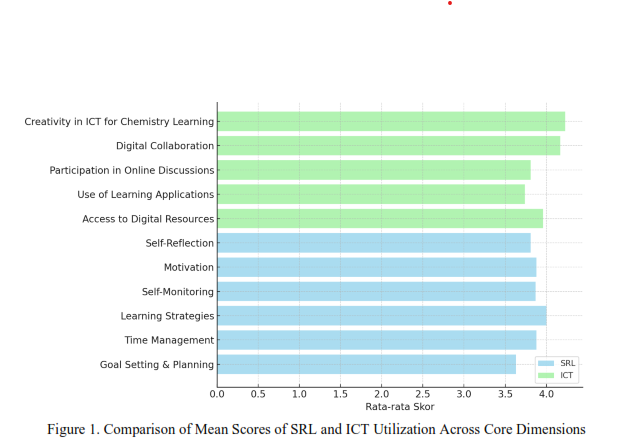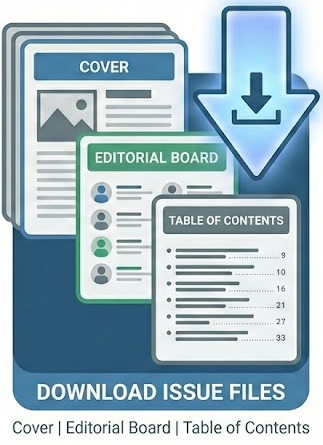Exploring Self-Regulated Learning and ICT Integration in Chemistry Education: A Study in the Digital Era
DOI:
https://doi.org/10.30736/seaj.v7i2.1299Keywords:
Chemistry Education, Digital Learning, ICT Utilization, Self-Regulated Learning, Student ProfileAbstract
Profiling Self-Regulated Learning and ICT Utilization among Chemistry Education Students in the Digital Era. In the digital era, chemistry education faces dual challenges: fostering students’ self-regulated learning (SRL) while optimizing the use of information and communication technology (ICT). This study aims to profile the levels of SRL and the extent of ICT utilization among chemistry education students, providing insights into how both aspects intersect in supporting academic success. A descriptive quantitative design was employed, involving 26 third-year chemistry education students at Universitas Negeri Makassar. Data were collected through two instruments: an SRL questionnaire covering dimensions of goal setting, planning, time management, learning strategies, self-monitoring, motivation, and self-reflection, and an ICT utilization questionnaire addressing access to digital resources, use of learning applications, participation in online discussions, digital collaboration, and creativity in ICT-supported chemistry learning. Responses were analyzed using descriptive statistics and thematic analysis of open-ended items. The results revealed that students’ SRL abilities ranged from moderate to high, with notable strengths in goal setting, planning, and reflection, but persistent challenges in time management and independent study. In contrast, ICT utilization was consistently high across all dimensions, showing strong reliance on digital resources and collaborative tools. A comparative analysis indicated that students rely more on external ICT support than on internal self-regulatory strategies. The study concludes that while ICT integration in learning is robust, strengthening SRL remains essential to balance technology use with sustainable learning autonomy. These findings suggest the need for instructional designs that deliberately embed SRL-enhancing components into ICT-based learning, aligning with the demands of the digital era and the pursuit of quality education
Downloads
References
Biwer, F., H. Bruin, A. B., & Persky, A. M. (2022). Study Smart – Impact of a Learning Strategy Training on Students’ Study Behavior and Academic Performance. Advances in Health Sciences Education. https://doi.org/10.1007/s10459-022-10149-z
Bowles, M. (2024). Digital, Self-Regulated Vocabulary Learning and Device Control in Out-of-Class, Higher Education Settings. The Electronic Journal of E-Learning. https://doi.org/10.34190/ejel.22.1.3261
Ekici, F., & Atasoy, B. (2023). Implementation of Strategy Instruction to Promote Pre-Service Chemistry Teachers’ Self-Regulated Learning Skills. Shanlax International Journal of Education. https://doi.org/10.34293/education.v11is1-jan.5863
Faulconer, E., Griffith, J. C., Wood, B. L., Acharyya, S., & Roberts, D. (2018). A Comparison of Online and Traditional Chemistry Lecture and Lab. Chemistry Education Research and Practice. https://doi.org/10.1039/c7rp00173h

Downloads
Published
How to Cite
Issue
Section
License
Copyright (c) 2025 Munawwarah, Sumiati Side

This work is licensed under a Creative Commons Attribution-ShareAlike 4.0 International License.
Authors who publish with this journal agree to the following terms:
- Authors retain copyright and grant the journal right of first publication with the work simultaneously licensed under a Creative Commons Attribution-ShareAlike 4.0 International License that allows others to share the work with an acknowledgment of the work's authorship and initial publication in this journal.
- Authors are able to enter into separate, additional contractual arrangements for the non-exclusive distribution of the journal's published version of the work (e.g., post it to an institutional repository or publish it in a book), with an acknowledgment of its initial publication in this journal.
- Authors are permitted and encouraged to post their work online (e.g., in institutional repositories or on their website) prior to and during the submission process, as it can lead to productive exchanges, as well as earlier and greater citation of published work (See The Effect of Open Access).

This work is licensed under a Creative Commons Attribution-ShareAlike 4.0 International License.








